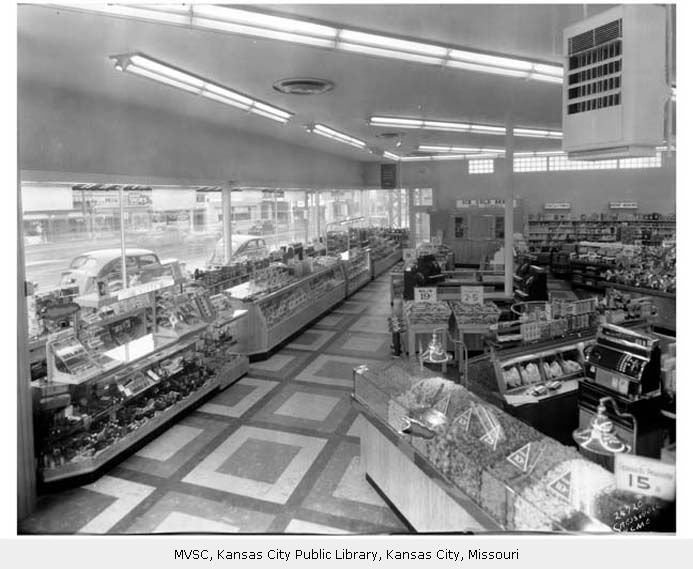The Story of Katz Drug Stores
Isaac “Ike” Katz. Courtesy: MVSC.
Katz Drug Stores played a major role in Kansas City’s commercial history, helping shape the retail pharmacy industry with innovations in convenience, marketing, and community engagement.
Founded by brothers Ike and Mike Katz, the business grew from a small cigar shop into a successful chain of stores that offered everything from prescriptions to groceries, appliances, and even exotic pets. Katz Drug Stores not only transformed retail but also left a lasting impact on Kansas City’s architecture, civil rights history, and economic development.
The Ukrainian Immigrant's Dream
Photo of a 16th century Synagogue in Husiatyn, Ukraine - Ike’s hometown.
Isaac “Ike” Katz was born in 1879 in Husiatyn, Ukraine, and immigrated to the United States with his family in search of new opportunities. Settling in St. Paul, Minnesota, the family struggled financially, and Ike left school early to help support them. He worked as a traveling salesman on the Great Northern Railroad, gaining valuable business experience that would later shape his retail empire.
Ike and Mike Katz - brothers and co-founders of Katz Drug Stores.
By the early 1900s, Ike and his younger brother Mike moved to Kansas City, where they initially ran fruit stands and later cigar stores. However, two key events changed their business path—the relocation of the city’s railroad hub to Union Station and the impact of World War I. Seeking a way to keep their stores open despite wartime restrictions, the brothers hired a pharmacist, allowing them to transition into the drugstore business. This decision marked the beginning of Katz Drug Stores.
A Retail Revolution
Katz Drug Store located on the ground floor of Hotel Phillips. Courtesy: MVSC
Katz Drug Stores revolutionized the shopping experience by offering an expanded range of products under one roof. At a time when pharmacies mainly focused on prescriptions and medical supplies, Katz stores introduced a wide selection of general merchandise, including groceries, cosmetics, and household goods. This innovative approach set the stage for the modern drugstore model, combining convenience and affordability.
Marketing played a major role in the company’s success. During World War I, Katz Drug Stores attracted customers by covering the government-imposed 10% tax on cigarettes, promoting the slogan “Katz Pays the Tax!” This strategy, along with competitive pricing and frequent sales, helped the brand expand rapidly across Kansas City and beyond.
“Katz Pays The Tax!”
In 1934, Katz Drug Stores opened a flagship location at Main Street and Westport Road. Designed by architect Clarence Kivett, the store featured modern amenities like air conditioning and a large parking lot—both rare for the time. The striking Art Deco design, including the iconic cat-shaped clock tower, became a Kansas City landmark.
Flagship Katz Drug Store at Main and Westport.
Throughout the mid-20th century, Katz Drug Stores became more than just retail spaces—they were community hubs. Shoppers could fill prescriptions, eat at the lunch counter, and gather at soda fountains.
Interior of a Katz Drug Store
Beyond retail, Ike Katz was a generous philanthropist, contributing to hospitals, religious institutions, and the arts. His strong ties to the community helped cement the brand’s reputation as a trusted and essential part of everyday life.
Evolution & Legacy
Interior of Katz Drug Store at Linwood & Troost. Courtesy: MVSC
At its peak, Katz Drug Stores operated 65 locations, generating over $100 million in annual sales. Over time, the company merged with Skaggs and later became part of Osco, before eventually transitioning into CVS Pharmacy. While the brand itself disappeared, its influence on retail remains visible in today’s pharmacy chains, which continue to emphasize convenience, affordability, and variety—principles pioneered by Katz Drug Stores.
Architecturally, Katz’s legacy endures. The clock tower at the Main Street location, once a symbol of the company’s presence, is set to be preserved as part of a redevelopment project. The story of Katz Drug Stores is not just one of business success but of transformation, community involvement, and innovation.
Autochrome photograph of the Katz Residence at 2435 Drury Ln, Kansas City, MO. Courtesy: Frank Lauder Autochrome Collection, MVSC.
Ike Katz passed away on November 9, 1956, and is buried in Rose Hill Cemetery. His contributions to retail and Kansas City’s history continue to be felt, reminding us of how vision and determination can shape industries and communities for generations to come.








